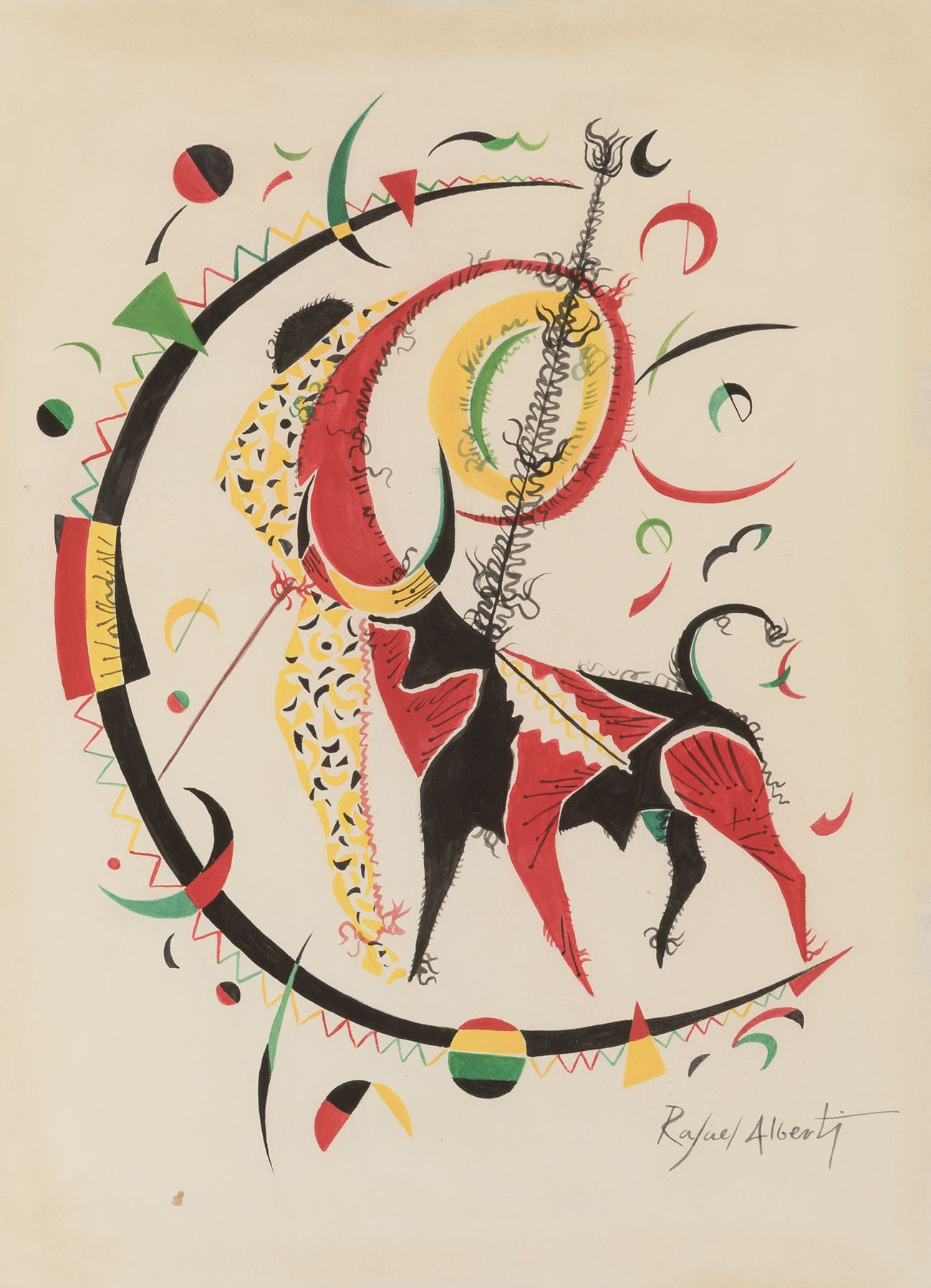Description
RAFAEL ALBERTI (El Puerto de Santa María, Cádiz, 1902 - 1999). Untitled. Mixed media on paper. Signed in the lower right corner. Measurements: 59,5 x 42 cm; 80 x 63 cm (frame). Rafael Alberti was a writer and poet belonging to the Generation of 1927, considered one of the greatest writers of the so-called Silver Age of Spanish literature. He received numerous prizes and awards, including the National Poetry Prize (1925), the Lenin de la Paz (1965), the National Theatre Prize (1980), the Cervantes Prize (1983) and the Roma Prize for Literature (1991). He renounced the other great Spanish literary award, the Prince of Asturias, because of his strong republican convictions. Rafael Alberti's first vocation was painting, but his real discovery of this art came in 1917, when he moved to Madrid with his family and visited the Prado Museum for the first time. He first exhibited his work in 1920 at the Salón de Otoño in Madrid, and two years later he exhibited at the Athenaeum in the same city. His painting was characterised by the fact that it was not his definitive path, since after the death of his father, he began to write his first verses. As a writer, Alberti enjoyed great success from the beginning of his career, but at first his success was linked to artistic prestige, as he was still financially dependent on his family. The new literary magazines accepted and wanted to publish his works. He was also beginning to make friends within the circle known today as the Generation of '27. He began to write in a style that was not only more formally demanding, but also allowed him to be more satirical and dramatic. From then on, his life gradually opened up to what would become the centre of his inspiration, poetry, without ever completely abandoning his vocation as a painter. Among his last works is A la pintura ('On Painting') (1945). These reflect his intellectual activity during his exile, as Alberti returned to painting and began a series of poems to bring together his thoughts on painting. A subject to which he continued to devote himself for many years. Among these poems dedicated to painting he wrote a series of sonnets on the retina, the hand, the canvas, the brush, etc.; a series of short poems in free verse on colours; and finally a series of poems in homage to various painters such as Titian, El Greco and others.
23
RAFAEL ALBERTI (El Puerto de Santa María, Cádiz, 1902 - 1999). Untitled. Mixed media on paper. Signed in the lower right corner. Measurements: 59,5 x 42 cm; 80 x 63 cm (frame). Rafael Alberti was a writer and poet belonging to the Generation of 1927, considered one of the greatest writers of the so-called Silver Age of Spanish literature. He received numerous prizes and awards, including the National Poetry Prize (1925), the Lenin de la Paz (1965), the National Theatre Prize (1980), the Cervantes Prize (1983) and the Roma Prize for Literature (1991). He renounced the other great Spanish literary award, the Prince of Asturias, because of his strong republican convictions. Rafael Alberti's first vocation was painting, but his real discovery of this art came in 1917, when he moved to Madrid with his family and visited the Prado Museum for the first time. He first exhibited his work in 1920 at the Salón de Otoño in Madrid, and two years later he exhibited at the Athenaeum in the same city. His painting was characterised by the fact that it was not his definitive path, since after the death of his father, he began to write his first verses. As a writer, Alberti enjoyed great success from the beginning of his career, but at first his success was linked to artistic prestige, as he was still financially dependent on his family. The new literary magazines accepted and wanted to publish his works. He was also beginning to make friends within the circle known today as the Generation of '27. He began to write in a style that was not only more formally demanding, but also allowed him to be more satirical and dramatic. From then on, his life gradually opened up to what would become the centre of his inspiration, poetry, without ever completely abandoning his vocation as a painter. Among his last works is A la pintura ('On Painting') (1945). These reflect his intellectual activity during his exile, as Alberti returned to painting and began a series of poems to bring together his thoughts on painting. A subject to which he continued to devote himself for many years. Among these poems dedicated to painting he wrote a series of sonnets on the retina, the hand, the canvas, the brush, etc.; a series of short poems in free verse on colours; and finally a series of poems in homage to various painters such as Titian, El Greco and others.
